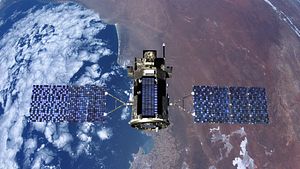China’s ability to wage war in space is a major concern for the United States, a U.S. admiral said this week. Admiral Cecil D. Haney, commander of U.S. Strategic Command (the command force responsible for U.S. nuclear forces and missile defense), made the remarks in a press briefing at the Department of Defense on Tuesday.
Haney referenced Chinese missile tests designed to target satellites in low-earth orbit, one in July 2014 and one in 2007. Haney said the U.S. watched the 2007 test “with astonishment,” noting that the successful destruction of the targeted satellite “created just thousands and thousands of pieces of debris that we are confronted with even today.”
Haney acknowledged that the July 2014 test (which China described as an “anti-missile technology experiment”) did not actually hit a satellite, perhaps by design. “But just seeing the nature of these types of activities show how committed they are to a counter-space campaign,” he explained.
“The threat in space, I fundamentally believe, is a real one. It’s been demonstrated,” Haney said. As a result, Haney argued that the U.S. must “be ready for any campaign that extends its way into space.”
Asked what “being ready” meant, Haney emphasized the need to “be able to really recognize what’s going on in outer space.” The “Space Situational Awareness Program,” Haney said, involves “really being able to monitor and attribute any mischief that is detected in space.” The U.S. is also “working to develop responsive capabilities in space — tactics, techniques and procedures, [with] more flexibility and agility there.”
Haney also raised concerns about other countries’ missile programs, including Russia, Iran, and North Korea, but when it came to counter-space capabilities he focused on China. He’s far from the only U.S. official worried about China’s counter-space abilities. Earlier in March, both Deputy Secretary of Defense Robert Work and Under Secretary of Defense for Acquisition, Technology, and Logistics Frank Kendall warned that the U.S. was losing its technological edge in the space domain.
The Pentagon’s 2014 report on Chinese military development noted that “China is developing a multi-dimensional program to improve its capabilities to limit or prevent the use of space-based assets by adversaries during times of crisis or conflict.” According to the report, “PLA strategists regard the ability to use space-based systems – and to deny adversaries access to space-based systems – as central to enabling modern, ‘informationized’ warfare.” The Pentagon cites a number of PLA analysts who emphasized the importance of destroying enemy reconnaissance and communications satellites. The report noted that, in addition to anti-satellite missiles, China could use “directed energy weapons and satellite jammers” to destroy or disable enemy satellites in the event of a conflict.
Despite those concerns, other voices (including The Diplomat’s own Franz-Stefan Gady) have argued that the threat is not as dire as U.S. defense officials make it seem.
































